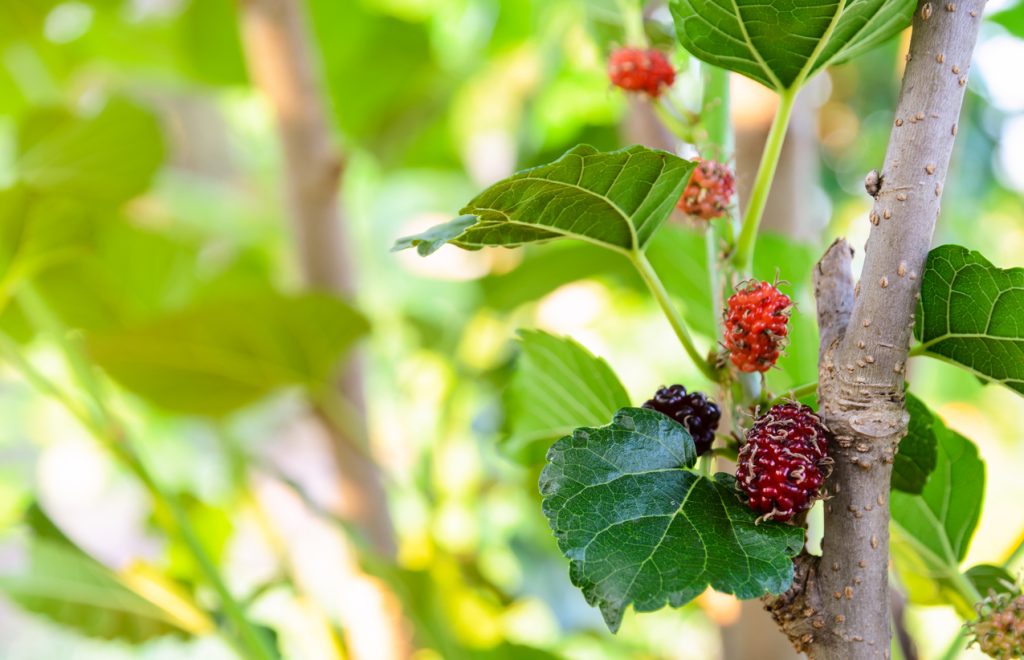Mulberry Twig (Sang Zhi)

What is Mulberry Twig (Sang Zhi)?
Mulberry Twig (sang zhi, 桑枝) comes from the branches of the Mulberry Tree, also known as Morus alba, a member of the moraceae family. Native to East Asia, the Mulberry Tree is now grown worldwide. With flowers that bloom in May, Mulberry Trees can reach a height of more than 30 feet, and can survive bad weather conditions.
In China, every part of the Mulberry plant has its unique and diverse therapeutic uses. The berries are bottled as a beverage to enhance immunity and promote good health. The bark is honey-fried to enhance the stop coughing and wheezing functions of good quality bark is thick, powdery and white. The leaves are also used as an external wash for eye problems.
Mulberry Twigs are gathered at the end of spring or the beginning of summer, dried under the sun and cut into slices for medicinal usage.
In Traditional Chinese Medicine (TCM), Sang Zhi falls under the category of ‘Herbs that dispel Wind and Dampness’. Cool in nature, Sang Zhi can help individuals with too much Heat in their body, such as those experiencing a Yang Excess or a Yin Deficiency, to restore a healthy yin-yang balance. Bitter in taste, Sang Zhi can cleanse the body by clearing Heat, drying Dampness and promoting elimination via urination or bowel movements. In particular, the herb targets the Liver.
Functions and Benefits of Mulberry Twig (Sang Zhi)
Traditional Chinese Medicine (TCM) shows that Sang Zhi has the following health benefits.
Sang Zhi can dispel Wind-Dampness, unblock channels and collaterals, and stop spasms. This herb can benefit the joints and treat symptoms of arthralgia such as numbness in the extremities, joint pain, muscle spasms, hemiplegia or post-stroke paralysis. As Sang Zhi can expel Wind from the body, it can relieve itching, vitiligo and rashes as well.
Sang Zhi can also promote diuresis and reduce edema by regulating water metabolism. The herb can relieve symptoms such as edema and dysuria, especially when accompanied by joint pain. In addition, Sang Zhi can quicken healing and encourage blood circulation to treat fractures.
Modern studies suggest that Sang Zhi contain anti-inflammatory properties, as it was found that the herb may inhibit croton oil-induced swelling in mice and egg white-induced feet swelling in mice. Hence, the herb may help to combat inflammation and reduce cellular damage that leads to long-term illnesses, including cancers and liver disease. Sang Zhi may also help to combat inflammatory conditions such as arthritis and rheumatoid arthritis.
Other than the above Mulberry Twig benefits, other research also suggests that Sang Zhi may help to lower blood pressure levels by dilating blood vessels, and aid in diabetes management.

How to Use Mulberry Twig (Sang Zhi)
The recommended daily dosage of Sang Zhi is 9 – 15g, taken as a decoction. It is often combined with other herbs such as Siberian Ginseng, Tetrandra Root and Chinese Star Jasmine in herbal formulas.
Dried slices of Sang Zhi can be found in certain Asian markets, herbal shops and specialty stores. Sang Zhi is also available in other supplement forms such as powder.
Cautions and Side Effects of Mulberry Twig (Sang Zhi)
Sang Zhi should not be used by individuals who are experiencing frequent urination or cough caused by Wind-Cold. Pregnant and breastfeeding ladies should also stay away from this herb for the time being out of safety concerns.
We strongly encourage you to consult your healthcare provider before deciding to add Sang Zhi to your healthcare routine.
Summary
Here is a summary for Mulberry Twig (Sang Zhi):
- Herb name (Chinese): 桑枝
- Herb name (Pin Yin): sāng zhī
- Herb name (English): Mulberry Twig
- Herb name (Botanical): Ramulus Mori
- Origin of species: Morus alba L.
- Part(s) of herb used: Young branch
- Geo-specific habitat(s): Guangdong, Hainan, Shandong, Fujian, Liaoning
- Taste(s) & Properties: Slightly bitter; Neutral; Administrates the Liver Meridian
- Actions: Eases rheumatic and arthritic pain; Relieves water retention; Eases skin itching
References
Ahn, E., Lee, J., Jeon, Y. H., Choi, S. W., & Kim, E. (2017). Anti-diabetic effects of mulberry (Morus alba L.) branches and oxyresveratrol in streptozotocin-induced diabetic mice. Food Science and Biotechnology, 26, 1693-1702. [Accessed on 28th January 2023]
Chang, L. W., Juang, L. J., Wang, B. S., Wang, M. Y., Tai, H. M., Hung, W. J., … & Huang, M. H. (2011). Antioxidant and antityrosinase activity of mulberry (Morus alba L.) twigs and root bark. Food and Chemical Toxicology, 49(4), 785-790. [Accessed on 28th January 2023]
Cui, X., & Kim, E. (2019). Anti-inflammatory effects of mulberry twig extracts on dextran sulfate sodium-induced colitis mouse model. Journal of Nutrition and Health, 52(2), 139-148.[Accessed on 28th January 2023]
Jan, B., Parveen, R., Zahiruddin, S., Khan, M. U., Mohapatra, S., & Ahmad, S. (2021). Nutritional constituents of mulberry and their potential applications in food and pharmaceuticals: A review. Saudi journal of biological sciences, 28(7), 3909-3921.[Accessed on 28th January 2023]
Share this article on
